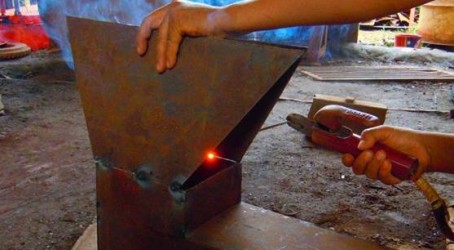Articles
Researchers from around the world have joined forces to develop a sound-powered stove which could address the energy needs of rural communities in developing countries.
The stove-generator can convert waste heat into acoustic energy and then into electricity, all in one unit. Development work is being led by staff at the department of electrical and electronic engineering at the University of Nottingham.
The appliance exploits the fact that a properly dimensioned tube, which is heated at one end and has a porous heat-absorbing substance separating it from the cooler end, will generate a sound. When a loudspeaker is attached to the open end of the tube the sound oscillates the coil in the speaker and the moving coil generates electricity.
Refrigeration is produced by taking the same tube and driving a sound into it. The air moves past the heat absorber – the air compressing (and heating) and decompressing (and cooling) causes one end of the tube to get hot and the other to get cold.
The stove can be used for cooking, refrigeration and electricity generation. The appliance consumes half the amount of wood (or even dung) that a regular wood fire would use. It creates significantly less smoke which is a deadly hazard within many rural homes in developing countries.
Electricity generated by the stove can power LEDs and charge mobile phone batteries. Further developed versions could potentially power a computer.
Following encouraging results in the lab, the stove is undergoing tests in villages in Nepal and Bangladesh.
Project director Paul Riley said: “The successes in the lab are fantastic achievements for the project, but they’re only the beginning for us. The generators will be used in areas across a world which has limited access to a reliable power source.
“We must adapt the lab version for each area, taking into account local biomass fuels and types of pots and pans used to cook, along with the everyday tasks the unit will be required for.”
Researchers at the University of Nottingham’s Malaysia campus, Kathmandu University in Nepal, the Bangladesh University of Engineering and Technology, and the charity Practical Action plan to adapt the stoves for power production in various local environments.
Energy company Alstom has provided €100,000 for field trials in Nepal, while Engineers Without Borders is financially supporting four research students at Kathmandu University.
Riley added: “The stove must be able to be produced affordably and locally, rather than shipped in from overseas at great expense. That means assessing local access to materials like stainless steel and looking for workable alternatives where they’re not readily available.
“Adaptability is hugely important. We must preserve the excellent levels of performance that we’re seeing in our labs. The tremendous support we have from our partners across the academic, charity and energy sectors is instrumental in this.”

Building the stove is a team university challenge:
- Engineers at Nottingham are developing the generator’s linear alternator. The system uses special configurations of magnets which generate electricity from sound.
- Researchers at City University London are working on the stove design and the thermo-acoustic engine. The team is also assisting with the structural analysis of the engine and the development of low-cost manufacturing methods for the engine components.
- Researchers at the school of engineering and materials science at Queen Mary, University of London are working on the heat-transfer aspects of the device.
- University of Manchester researchers are focusing on the design of the thermo-acoustic engine, which sits at the heart of the appliance.